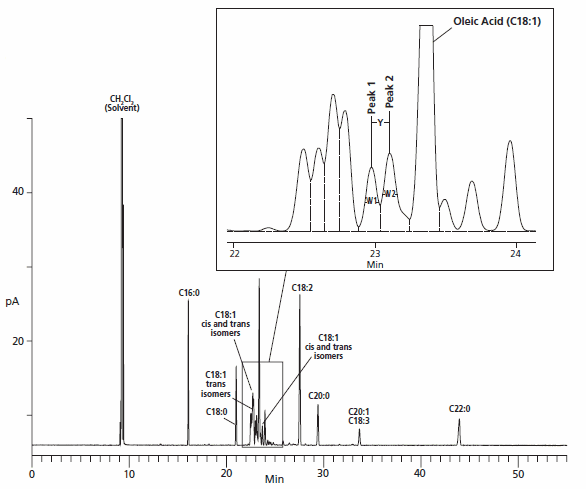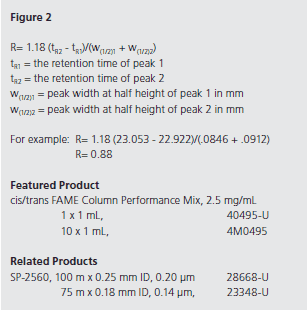New cis/trans FAME Standard for GC Optimization
AOCS and AOAC methods for determining the trans fatty acid composition of foods by gas chromatography require the use of a highly polar cyanosilicone capillary column to provide the best peak resolution attainable of the numerous geometric (cis & trans) and positional isomers. Due to the highly polar nature of these phases, subtle changes in the GC system can alter the chromatographic separation of the positional cis & trans isomers. Therefore, it is important to continually monitor column performance and correct for unexpected changes in the column flow, oven temperature, column degradation and/or sample concentration as they occur.
AOCS Method Ce 1h-05 recommends using a wellcharacterised mixture of fatty acid methyl esters (FAMEs) covering the range of fatty acids under investigation to monitor changes in column performance over time. Sigma-Aldrich’s new cis/trans FAME Column Performance Mix is an excellent choice for monitoring these changes. This qualitative mix is specifically designed to optimise and monitor performance changes per AOCS Method Ce 1h-5 and AOAC Method AOAC 996.06. The mix contains C18:1 cis/trans positional isomer of critical importance to the food industry.
Because some cis/trans positional FAMEs are difficult to separate and baseline resolution may not be possible, regular use of the Sigma-Aldrich FAME Column Performance Mix is of utmost importance to achieve the required column performance. Small changes in the sample size, sample concentration, or oven temperature may be required to achieve the best resolution between the C18:1 cis/trans isomers. Once optimal resolution for the column is established, weekly analysis of the mix allows monitoring of the column’s performance.

Figure 1.Cis/Trans FAME Column Performance Mix; 2.5 mg/mL in Methylene Chloride.
The analyst injects the mix, and identifies the peaks labelled as “1” and “2” in Figure 1. The resolution between these peaks is then calculated using the equation shown in Figure 2. It is important to run the mix upon initial installation of a new capillary column to ensure that conditions are established to optimise resolution. Optimum resolution between two peaks is defined as “baseline” resolution. Full baseline resolution is achieved when the R-value calculated using the equation in Figure 2 is approximately 1.5 or greater. The example chromatogram shown in Figure 1 illustrates the measurements required when calculating the resolution value – specifically peak width and retention time. As is evident in Figure 1, baseline resolution of peaks 1 and 2 will not be attained under normal testing conditions. The minimum acceptable resolution value will be described in a future revision of AOAC Method Ce 1h-05. For now, laboratories must establish their own criteria.
At present, no column will fully resolve all C18:1 cis/ trans positional isomers. By utilising the cis/trans FAME Column Performance Mix, analysts can optimise column performance before assaying complex mixtures. Regular use also makes it possible to monitor column degradation and to recognise when to replace the capillary column.
Materials
References
如要继续阅读,请登录或创建帐户。
暂无帐户?